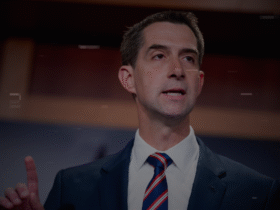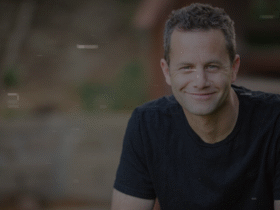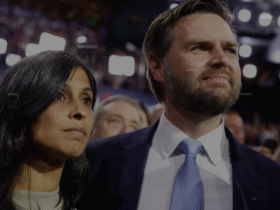David Corenswet stance on Israel has become a hot topic since Superman soared to the top of the box office charts, making over $220 million globally during its opening weekend. Despite its commercial success, the film has sparked intense debate about its political subtext, with many viewers claiming to see parallels to the Israel-Palestine conflict.
When audiences left early screenings, many carried the unmistakable feeling they had just watched a parable of the Israeli-Palestinian conflict. The imagery is particularly striking: tanks and drones lining up at a border fence, a young boy clutching a national flag as civilians scatter in fear. Meanwhile, director James Gunn’s characterization of Superman as an “immigrant” telling the “story of America” has further fueled the David Corenswet political controversies. In fact, one viral review discussing these themes garnered more than 11 million views and 36,000 likes on social media.
In this article, we’ll examine the growing debate around David Corenswet’s Hollywood lobby influence, explore the film’s controversial scenes, and analyze how a superhero created in 1938 by Jewish immigrants has become the center of unexpected political discourse.
David Corenswet’s Role in the New Superman Film
When James Gunn announced David Corenswet as the new Man of Steel, the choice immediately sparked curiosity about how this relatively unknown actor would handle the iconic role. Unlike previous Superman actors, Corenswet stepped into the superhero suit at a time when comic book adaptations increasingly reflect real-world political tensions.
Casting and public expectations
The 31-year-old actor faced tremendous pressure stepping into a role previously inhabited by legends like Christopher Reeve and Henry Cavill. As a Juilliard graduate with limited mainstream exposure, many questioned whether Corenswet possessed the gravitas to embody America’s most recognizable superhero. Moreover, audiences wondered if his interpretation would lean into or away from the character’s complex immigration narrative.
Superman as a political symbol
Throughout his 80+ year history, Superman has evolved from a Great Depression-era champion of social justice to a Cold War patriot to a modern symbol of American idealism. The character—created by Jerry Siegel and Joe Shuster, two Jewish-American artists—has always carried political subtext.
In today’s polarized environment, Superman’s alien refugee status has gained renewed significance. The character embodies both the immigrant experience and American exceptionalism—a duality that makes him particularly relevant to contemporary debates about borders, belonging, and national identity.
Initial reactions to Corenswet’s performance
Early audience responses to Corenswet have largely focused less on his acting capabilities and more on how his Superman fits into ongoing political conversations. Rather than debates about his portrayal’s faithfulness to comic book lore, viewers are dissecting how his character responds to authoritarian figures and border conflicts within the film.
While some praise Corenswet’s nuanced performance that avoids overt political positioning, others scrutinize every line and scene for evidence of the actor’s personal stance on real-world issues, especially regarding Israel and Palestine. This scrutiny reflects how superhero narratives have become battlegrounds for competing political viewpoints in contemporary culture.
The Israel-Palestine Allegory Debate
“The ship my parents sent me was damaged in transit, so I only ever heard the first part of the message. And I believed I knew how it ended—that my parents had sent me here to serve the people of Earth and to be a good man. I’m not here to rule over anybody, Lois.” — David Corenswet, Actor, plays Superman in Superman (2025)
The Superman film’s most controversial element emerged from a seemingly fictional geopolitical conflict that many viewers interpreted as commentary on real-world tensions. The debate quickly transcended typical superhero movie discussions, evolving into heated exchanges about political allegories and filmmaker intent.
Plot parallels with real-world conflicts
At the center of controversy is Superman’s intervention in a fictional conflict between two countries: Boravia (a technologically advanced superpower and U.S. ally) and Jarhanpur (a smaller, politically unstable nation). The film depicts Superman stopping Boravian tanks, rerouting drones, and shielding civilians—all without killing anyone.
The visual language is striking: Boravian soldiers in full military gear encroaching on crowds of Jarhanpurian civilians, reminiscent of some of the Israel Defense Forces confronting Palestinians. Additionally, a conversation between Superman and Lois Lane echoes contemporary debates about intervention—Lois mentions Boravia’s claim of “freeing” Jarhanpurians from a tyrannical government, whereas Superman argues Boravia would simply replace one despotic regime with another.
Audience interpretations and online discourse
Online reactions have been polarized. Political commentator Krystal Ball wrote on social media, “Feels like a major cultural moment that Israel is quite clearly the bad guy villain country in a big budget Hollywood movie”. Left-wing streamer Hasan Piker described the film as “two hours and like 10 minutes of fuck Israel the entire time”.
Conversely, conservative commentator Ben Shapiro argued that only those with a “left-wing brain” would view the film as a commentary on Israel-Palestine. Some Reddit users expressed distress that “a superhero created by two Jewish artists is now being used to promote anti-Israeli messages”.
David Corenswet Stance on Israel: No Public Position Known
As of now, there is no official or public record of David Corenswet expressing a stance on Israel. While the actor, known for portraying Superman in James Gunn’s upcoming DC Universe, has been identified as Jewish, he has not made any political statements regarding Israel or the ongoing Israel-Palestine conflict.
Interest in David Corenswet stance on Israel has increased, particularly as political discourse increasingly intersects with pop culture and celebrity activism. However, Corenswet has largely kept his public persona focused on his acting career, and no comments—direct or indirect—have surfaced regarding Middle Eastern politics.
James Gunn’s denial and clarifications
James Gunn has consistently rejected these interpretations, stating: “When I wrote this, the Middle Eastern conflict wasn’t happening. So I tried to do little things to move it away from that, but it doesn’t have anything to do with the Middle East”. He noted his script was completed in May 2023, months before the current Israel-Gaza conflict escalated.
Nevertheless, the film has become a cultural touchstone in discussions about Hollywood’s portrayal of geopolitical conflicts, regardless of authorial intent. The debate itself demonstrates how audiences bring their own perspectives to fictional narratives, often finding reflections of contemporary issues even where none were explicitly intended.
Hollywood Lobby Influence and ADL Ties
Beyond the onscreen political allegories, the financial side of Hollywood intertwines deeply with real-world politics. The film industry contributes billions to the US economy annually, giving studios substantial political leverage.
Understanding the Hollywood lobbying ecosystem
Hollywood’s political machinery operates through campaign contributions, lobbying efforts, and public advocacy campaigns. Most notably, the industry has historically favored Democratic candidates. Studios actively lobby for tax incentives and government support, shaping policies that affect not just entertainment but broader cultural landscapes.
David Corenswet ADL ties: Fact or speculation?
Although no direct evidence links Corenswet to the Anti-Defamation League (ADL), the organization maintains significant Hollywood connections. At a recent ADL summit, actor David Schwimmer urged Jewish celebrities to speak out against antisemitism. “I wish you would stand up. I wish you would speak out,” Schwimmer stated, emphasizing that such advocacy isn’t about solving Middle Eastern conflicts but standing against hatred.
How lobbying shapes film narratives
Entertainment conglomerates routinely advocate for laws affecting digital rights management, copyright, and international trade agreements. This advocacy can fundamentally shape how movies are distributed and what stories get told. Industry executives support political candidates through donations that potentially influence policy agendas.
Reactions from pro-Israel and pro-Palestinian groups
The intersection of Hollywood politics and Middle Eastern conflicts has created significant tensions among audiences. As Schwimmer noted at the ADL event, speaking out comes at a cost—he’s lost friends and received threats. Yet he maintains that silence carries greater risks, invoking Elie Wiesel: “The opposite of love is not hate. It’s indifference”.
David Corenswet Political Controversies and Public Backlash
“I’m as human as anyone. I love, I get scared. I wake up every morning and despite not knowing what to do, I put one foot in front of the other and I try to make the best choices I can. I screw up all the time, but that is being human. And that’s my greatest strength.” — David Corenswet, Actor, plays Superman in Superman (2025)
As Superman dominated the box office, conservative commentators launched a fierce campaign against what they labeled “Superwoke” propaganda. Fox News hosts openly mocked the film, with Jesse Watters joking that Superman’s cape read “MS-13” and Kellyanne Conway claiming viewers “don’t go to the movie theater to be lectured to”.
Right-wing criticism and ‘woke’ accusations
The backlash ignited after James Gunn described Superman as “an immigrant that came from other places” in an interview with The Times of London. Conservative media quickly branded the film “Superwoke,” with former Superman actor Dean Cain claiming Gunn’s political framing would “hurt the numbers on the movie”.
Superman as an immigrant metaphor
Historically, Superman—created by Jewish immigrants during rising fascism—has always embodied the immigrant experience. As Congressman Robert Garcia noted, “The Superman story is an immigration story of an outsider who tries to always do the most good”.
Social media trends and hashtag activism
Online discourse polarized dramatically, with hashtags like “#SupermanIsHamas” trending alongside viral posts either celebrating or condemning the film’s perceived politics. Simultaneously, positive “Hopecore” messaging emerged, praising Superman’s kindness as “rebellious” in today’s cynical climate.
Impact on Corenswet’s public image
Amid the political firestorm, Corenswet maintained professional composure. “I like to grow and improve myself with criticism,” he told Esquire. “I don’t take it personally. Quite the opposite, it’s a learning experience”.
Curious about where other celebrities stand on major global issues? Explore more profiles here.
Final Thoughts
Superman films fundamentally serve as cultural mirrors, reflecting our societal values and political tensions. The David Corenswet political controversies highlight how superhero narratives exist at an ideological crossroads—they both criticize power structures yet simultaneously reinforce traditional American values.
James Gunn emphasized that his Superman story centers on “basic human kindness” as a core value that “we have lost”. Consequently, when critics attacked the film’s perceived political messages, Gunn’s response was direct: “Screw them”.
Yet The Guardian pointed out an intriguing contradiction: “the buffoonish outrage over Superman’s immigration status has only served to highlight a void in the movie’s broader emotional resonance”. Indeed, some critics suggested the film could have more boldly explored Superman’s status as both an American immigrant and global citizen.
This tension between entertainment and meaningful social commentary emerges repeatedly throughout superhero cinema. As one academic analysis notes, superhero films often present “contradictory” ideological representations that function like a “flipping coin”.
Hence, David Corenswet stance on Israel may be less relevant than how audiences project their own political perspectives onto his performance. The debates surrounding Superman demonstrate how deeply cultural products shape—and are shaped by—the political landscape, even as Hollywood lobby influence continues operating behind the scenes.
FAQs
1. What is David Corenswet stance on Israel?
As of now, David Corenswet has not publicly stated a position on Israel. Although he is identified as Jewish and plays Superman in James Gunn’s 2025 film, there is no record of him commenting on the Israeli-Palestinian conflict. Public curiosity has grown due to the film’s political interpretations, but Corenswet has remained focused on his acting career.
2. Is David Corenswet pro-Israel?
There is no verified evidence that David Corenswet is explicitly pro-Israel. He has not made public statements supporting or opposing Israeli policies, nor has he affiliated himself with any known pro-Israel organizations. Discussions around his stance are largely based on fan speculation due to the perceived political undertones of the Superman film.
3. What is David Corenswet’s stance on Palestine?
David Corenswet has not expressed any direct or indirect support for Palestine either. His public statements, interviews, and social media presence focus on his work as an actor, especially in relation to his portrayal of Superman, without engaging in Middle Eastern politics.
4. Why is the new Superman film being linked to the Israel-Palestine conflict?
Audiences have interpreted certain scenes in the 2025 Superman film as symbolic of the Israel-Palestine conflict. Visuals showing tanks, drones, and border clashes between fictional nations have been seen as parallels to real-world military actions. However, director James Gunn denied any intentional reference to the Middle East, claiming the script was written before the current Gaza conflict.
5. Did James Gunn confirm that Superman is a metaphor for Palestine or Israel?
No, James Gunn explicitly denied that the Superman film serves as an allegory for the Israel-Palestine conflict. He stated the script was finalized months before the October 2023 Gaza escalation and clarified that any perceived parallels were unintentional.
6. Has David Corenswet made any political statements since becoming Superman?
David Corenswet has not made any political statements related to Israel, Palestine, or U.S. foreign policy. While his portrayal of Superman has ignited political debates, Corenswet has remained silent on geopolitical issues, choosing instead to address his role through the lens of character development and emotional storytelling.
7. Why are some people calling the new Superman movie “anti-Israel”?
Some viewers, particularly on social media, have interpreted the fictional war in the Superman movie as a critique of Israeli military tactics, especially given scenes of drone strikes and civilian casualties. Left-wing commentators like Hasan Piker have drawn strong parallels, while conservatives argue such readings are politically biased. However, the film does not name Israel directly.
8. Does the Superman film support Palestine?
The film does not mention Palestine or Israel directly. Any support for Palestine is implied only through audience’s interpretation of the fictional nations portrayed in the conflict. Superman’s role as a neutral protector of civilians has been read by some as pro-Palestinian, though this is not confirmed by the filmmakers.
9. Is David Corenswet affiliated with the Anti-Defamation League (ADL)?
There is no public record linking David Corenswet directly to the ADL. While the ADL has ties with Hollywood and has encouraged Jewish actors to speak out against antisemitism, Corenswet has not been documented participating in their events or campaigns.
10. How has the Israel-Palestine debate impacted David Corenswet’s public image?
The controversy has fueled intense online discussion around Corenswet’s Superman role, but he has maintained a neutral public image. While conservative critics have labeled the film “Superwoke,” Corenswet has stayed professional and refrained from engaging in the political debates surrounding the movie.
11. Was the Superman film intended to be political?
Director James Gunn has stated that the film’s central message is about “basic human kindness” and that it was not meant to address specific geopolitical conflicts. Nevertheless, due to current global tensions, audiences have projected political meanings onto its content, especially regarding Israel and Palestine.
12. Why is Superman viewed as a political symbol in 2025?
Superman’s origin as an alien immigrant, combined with his American upbringing, makes him a powerful metaphor for issues of immigration, power, and moral responsibility. In the current geopolitical climate, especially with Hollywood’s cultural influence, any depiction of war, borders, or justice can evoke real-world comparisons.







Leave a Reply